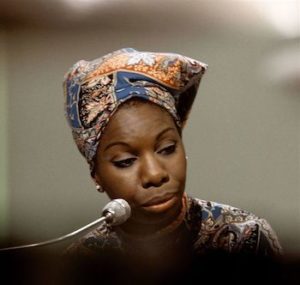
Nina Simone
*Nina Simone was born on this date in 1933. She was a Black vocalist and activist.
Her birth name was Eunice Kathleen Waymon, and she is one of eight children from Tryon, North Carolina. Her musical ability early on was demonstrated in the local Tryon church, where she played the piano and sang with her sisters in a choir. In 1943, she gave her first piano recital and experienced her first bout with racism as her parents were forced to move out of the front row so that several whites could be "properly" seated.
This event planted the seed that would blossom into her deeply rooted commitment to fighting prejudice and pioneering the 21st-century American Civil Rights movement through her music. As a young woman, she left North Carolina in 1950 for New York City. She studied at the Julliard School of Music and supported her family financially by working as an accompanist. In the summer of 1954, she worked in an Irish bar in Atlantic City, New Jersey. Without having time to realize what was happening, this trained classical pianist stepped into show business. She soon changed her name to Nina ("little one") Simone ("from the French actress Simone Signoret"). In the late 50s, Simone recorded her first tracks for the Bethlehem label.
These are still remarkable displays of her talents as a pianist, singer, arranger, and composer. Songs such as Plain Gold Ring, Don't Smoke In Bed, and Little Girl Blue soon became standards in her repertoire. I Loves You, Porgy, from the opera "Porgy and Bess," became a hit, and Simone became a star, performing at Town Hall, Carnegie Hall, and the Newport Jazz Festival. From the beginning of her career, her combining Bach-styled counterpoint, the improvisational approach of jazz, and the modulations of the blues, her talent could no longer be ignored. Other characteristics of Simone's art are her original timing, her use of silence as a musical element, and her often understated live act, sitting at the piano and advancing the mood and climate of her songs by a few chords.
When four Black children were killed in the bombing of a church in Birmingham in 1963, she wrote Mississippi Goddam, a bitter and furious accusation of the situation of her people in the USA. The intense emotional approach of this song and the others on her first Philips record ("Nina Simone In Concert") would become another characteristic of her art.
Although Simone was called "High Priestess of Soul," she was often misunderstood. When she wrote Four Women in 1966, a bitter lament of four Black women whose circumstances and outlook are related to subtle gradations in skin color, the song was banned on Philadelphia and New York radio stations because "it was insulting to Black people…" Her repertoire includes more Civil Rights songs: Why? The King of Love is Dead, capturing the tragedy of the assassination of Dr. Martin Luther King Jr., Brown Baby, Images (based on a Waring Cuney poem), and Go Limp, Old Jim Crow.
One song, To Be Young, Gifted and Black, inspired by Lorraine Hansberry's play with the same title, became the Black national anthem in the USA. She surprised many with "Nina Simone And Piano!" an introspective collection of songs about reincarnation, death, loneliness, and love, a highlight in her recording career. Her gift to give new and more profound dimensions to songs resulted in remarkable versions of Ain't Got No / I Got Life (from the musical "Hair"), Leonard Cohen's Suzanne, Bee Gee's songs as To Love Somebody, the classic My Way done in a tempo doubled on bongos, Just Like Tom Thumb's Blues and four other Bob Dylan songs. Disgusted with record companies, show business, and racism, she left the USA in 1974 for Barbados.
During the following years, she lived in Liberia, Switzerland, Paris, The Netherlands, and finally, the South of France. In 1978, a long-awaited record was released, "Baltimore," followed by "Fodder On My Wings." More than ever determined to make her music, Nina wrote, adapted, and arranged the songs, played piano and harpsichord, and sang in English and French. The 1988 CD re-release of this album included some bonus tracks, e.g., her extraordinary version of Alone Again Naturally, reminiscing her father's death.
1989, she contributed to Pete Townsend's musical "The Iron Man." In 1990, she recorded with Maria Bethania; in 1991, she recorded with Miriam Makeba. That same year, her autobiography, "I Put A Spell On You," was published. In 1993, Simone released "A Single Woman.” Her music continues to excite new and young listeners, and she still excites audiences worldwide. In 1998, she blamed racism in the United States for her decision to live abroad, saying that as a Black person, she has “paid a heavy price for fighting the establishment.” She did not elaborate but said racial inequality in the United States was now “worse than ever.”
At the Guinness Blues Festival in Dublin, Ireland, in 1999, her daughter, Lisa Celeste, performed as "Simone" and sang a few duets with her mother. Simone has toured the world, sung with Latin superstar Rafael, participated in two Disney theatre workshops, playing the title role in Aida and Nala in The Lion King. In 2000, she received Honorary Citizenship to Atlanta, the Diamond Award for Excellence in Music from the Association of African American Music in Philadelphia, and the Honorable Musketeer Award from the Compagnie des Mousquetaires d'Armagnac in France.
Nina Simone arguably was the ultimate songstress and storyteller of the 20th century. She died in her home on April 21, 2003.
Heart & Soul
A Celebration of Black Music Style in America 1930-1975
by Merlis Davin Seay, Forward by Etta James
Copyright 2002, Billboard Books
ISBN 0-8230-8314-4